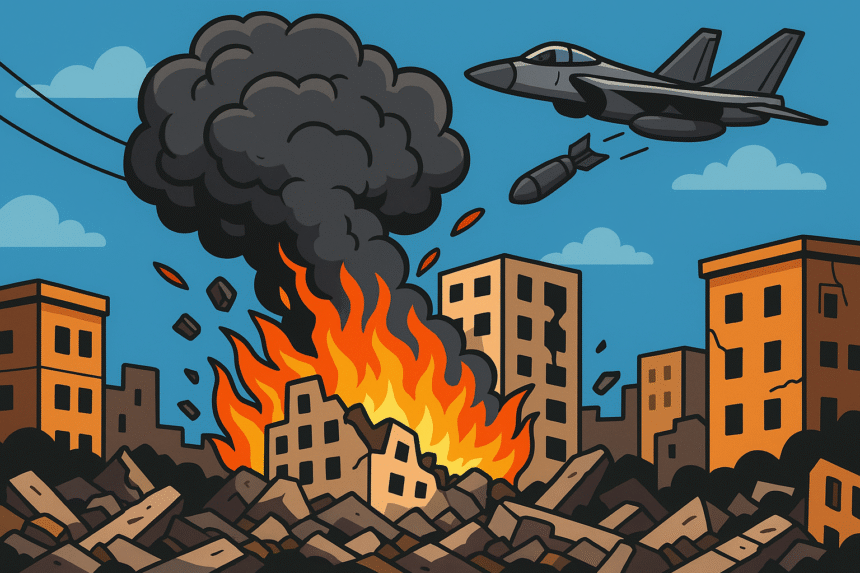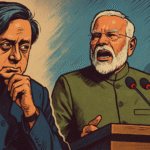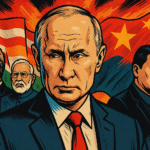Gaza burns under heavy Israeli airstrikes as politics, power, and promises collide. Civilians suffer while leaders trade words.
- The Scene: Gaza Under Fire
- America’s Unwavering Hug
- Civilians: Stuck Between Promises and Rubble
- Hamas Says “Stay Put”
- Numbers That Hurt
- Politics Over Humanity
- The Civilians’ Dilemma
- International Outrage, Selective Outrage
- The Bigger Picture
- Why It Matters to the World
- A Moment of Satire, Because Nokjhok
- Related Post Suggestion
Because nothing says “world peace” like another round of bombs raining down on civilians. Yes, dear readers, welcome to the never-ending Middle East match where the scorecard is written in smoke, rubble, and press statements.
Forget cricket rivalries—this is the world’s longest, deadliest series, and sadly, no one ever wins.
The Scene: Gaza Under Fire
On Tuesday, Israel launched heavy airstrikes on Gaza City, flattening residential blocks and shaking the world’s headlines once again. According to Reuters, more than 500 targets were hit in the last week—ranging from tunnels to weapons depots. Israel’s Defense Minister Israel Katz summed it up with the haunting line: “Gaza is burning.”
The smoke isn’t just literal—it’s symbolic of decades of unresolved tension. While some leaders speak of security, civilians on the ground only hear the sound of collapsing walls.
America’s Unwavering Hug
Enter Marco Rubio, US Secretary of State, who landed in Jerusalem like a VIP guest appearance in a long-running soap opera. His words? “Count on our unwavering support.” Translation: Israel, we got your back—even if the UN starts screaming.
He didn’t stop there. He dismissed Qatar’s ceasefire talks and called Hamas “barbaric animals.” Diplomatic? Not really. Blunt? Absolutely. Useful for civilians trapped in rubble? You guessed it—nope.
Civilians: Stuck Between Promises and Rubble
While leaders play chess, ordinary Palestinians are just trying to survive. Witnesses in Gaza described “relentless bombing” with people buried under debris. One young man told AFP, “We can hear their screams.”
And here lies the cruel irony: Israel urges civilians to flee before ground forces advance, but where exactly are they supposed to go? The so-called “humanitarian zones” are bursting at the seams. Roads are unsafe. Money is scarce. For many, moving is just a fantasy.
Hamas Says “Stay Put”
Meanwhile, Hamas is encouraging residents not to budge. Why? Because displacement means weakness. But for civilians, it means staying in neighborhoods that may not exist tomorrow. Between Israel’s bombs and Hamas’s rhetoric, the people of Gaza are trapped like pawns in a game they never asked to play.
Numbers That Hurt
Let’s talk cold, harsh statistics. Gaza’s health ministry reports 64,900 deaths since October 2023, mostly civilians. Yes, you read that right—64,900 human beings. Compare that to 1,219 people killed in Israel during Hamas’s October 7 attack, and you get a clear picture of the imbalance.
But here’s the thing—numbers can numb. Behind each statistic is a family torn apart, a child who won’t see another birthday, a parent burying dreams along with their loved ones.
Politics Over Humanity
While bombs drop, politics thrives. Netanyahu insists there can be no Palestinian statehood while Hamas exists. Rubio echoes, “No peace until Hamas is eliminated.”
On the flip side, many international players (including France, which is set to host a UN summit) argue it’s time to recognize Palestine as a state. But as always, Israel threatens “unilateral steps” if the world dares to go that way.
And then, like every good drama, there’s a subplot: Israel’s far-right leaders demanding annexation of the West Bank. The UAE, which normalized ties with Israel in 2020, isn’t too happy about this sequel.
The Civilians’ Dilemma
Imagine being told: “Leave now, ground forces are coming.”
And your reply: “Where? To the wasteland where three suburbs have already been flattened?”
Civilians are not soldiers. They don’t choose strategy, they don’t draft policy papers, and they certainly don’t order airstrikes. Yet, they pay the highest price. The UN has already warned that over one million people in Gaza face famine.Israel rejected this finding—but hunger doesn’t wait for political approval.
International Outrage, Selective Outrage
The UN shouts. Human rights groups cry. World leaders tweet. But here’s the uncomfortable truth: outrage has become background noise. When 45 people were killed in one day in Gaza, it barely made it to the front pages globally.
Why? Because the world has become used to Gaza being on fire. Normalization of tragedy is perhaps the deadliest weapon in this war.
The Bigger Picture
What’s unfolding is not just a battle of guns but a battle of narratives. Israel says it’s defending its citizens from Hamas terror. Hamas positions itself as the resistance against occupation. The US says it’s about supporting a key ally. And civilians? They’re left without food, shelter, or a voice.
War is no longer just on the battlefield. It’s on social media, on news tickers, on late-night debates. Every bomb is followed by a hashtag. Every death has to compete with trending celebrity gossip.
Why It Matters to the World
You might be reading this from your cozy sofa, sipping chai, thinking, “How does this affect me?” Well, global conflicts don’t stay confined. They shape oil prices, trigger refugee crises, influence elections, and even decide how your next Uber ride is priced.
When Gaza burns, the ripple effects are felt in Paris, New Delhi, Washington, and beyond.
A Moment of Satire, Because Nokjhok
If this were a cricket match, Israel would be batting endlessly, Hamas would keep bowling no-balls, and civilians? They’d be the unlucky fielders who keep getting hit by the ball without gloves. And the umpire (hello, UN) has lost the whistle ages ago.
Related Post Suggestion
👉 “Pakistani Doctor’s Affair Mid-Surgery: A Scandal in the UK”
Wars don’t need just headlines; they need conversations. If you’re reading this, don’t scroll past. Talk about Gaza. Discuss the imbalance. Question the politics. Share this piece with your circle, because silence is the easiest ally of destruction.
And if you’re a believer in peace, keep the conversation alive—on your WhatsApp groups, Insta stories, or over your next cup of coffee. Because awareness might not stop a bomb, but it can stop indifference.













